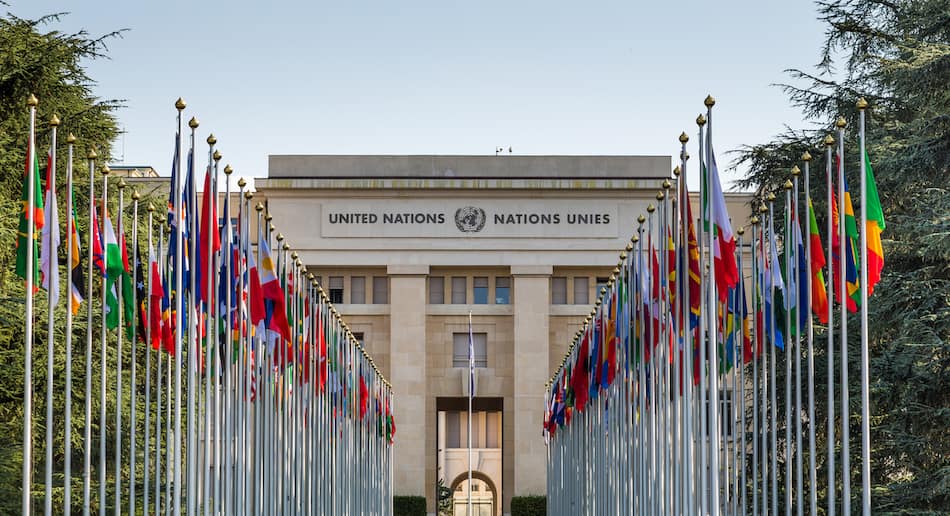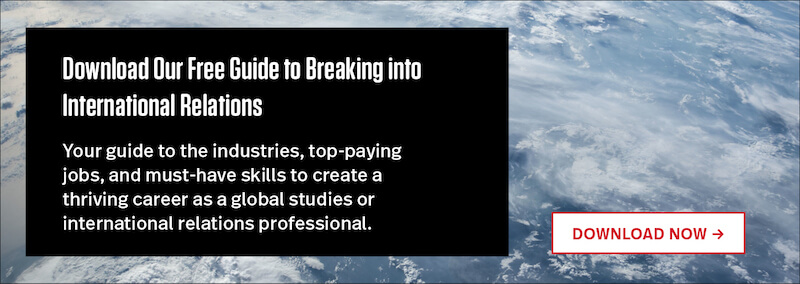Working at the UN is a dream job for many global studies and international relations students, and there’s no shortage of opportunities within the organization. The UN maintains nine distinct career paths, known as networks, each with its own hierarchies and areas of focus. Matching your skills and interests to one of these paths can help you tailor your education to your career goals and help you secure a highly sought UN position.
Download Our Free Guide to Breaking into Global Studies and International Relations
A guide for what you need to know to prepare for, and work in, today’s globalized world.
UN Career Paths
Though establishing a career within the UN can be difficult thanks to the organization’s popularity and the high caliber of applicants, it’s easy for professionals to explore multiple networks over the course of their careers.
“A key part of working within the UN system is networking with peers and looking at what opportunities might be available, particularly in fieldwork,” says Fiona Creed, faculty lead and associate teaching professor at Northeastern’s global studies and international relations program. “Work in the fields gives you a great idea as to how the UN really works, and once you’re in the system, it’s an accommodating one to work within and to impact.”
The following list highlights several options available to you within each path. The skills you’ll need for each will vary depending on the network’s focus, though Creed highlights good diplomatic sense and communication skills as essential for any division.
1. Management and Administration Network (MAGNET)
Professionals within the management and administration network focus on human and financial resources, ethics, internal investigations and audits, analysis, and administrative support. These careers offer the opportunity to impact the UN’s strategic direction, including decisions on procurement and budgets.
Job titles in this department include finance and budget officer, human resources assistance, and conduct and discipline officer.
2. Economic, Social, and Development Network (DEVNET)
Jobs within the economic, social, and development network are located within the UN’s New York headquarters and five regional economic commissions around the world. Staff members are responsible for promoting socio-economic development by performing analysis, preparing reports and publications, and organizing international conferences. Drug control, crime prevention, and training seminars also fall within this department.
Careers within DEVNET include programme management officer, economic affairs officer, and development coordination officer.
3. Political, Peace, and Humanitarian Network (POLNET)
When people think of the UN, they likely think of its humanitarian work and the roles within the political, peace, and humanitarian network. These include peacekeeping, human rights, disarmament, counterterrorism, and emergency relief jobs. While much of this work takes place in the field, professionals who can conduct analysis, prepare reports, and organize international committees are also needed.
Roles within this sector include human rights officer, political affairs officer, and humanitarian affairs officer.
4. Information and Telecommunication Technology Network (ITECNET)
With missions all over the world, fast and secure communication within the UN is essential. Professionals within this department set overall strategic directions for the organization, provide technical support, and formulate policy and compliance based on technology research and development.
If you’re interested in this department, you may work as an information systems officer or assistant specializing in a particular area of communication, such as SAP development and integration.
5. Legal Network (LEGALNET)
The UN’s legal network provides legal guidance on international, national, public, private, procedural, and administrative law. The network also processes and publishes treaty-related actions, provides treaty-related legal assistance to member states, and represents the UN in judicial proceedings, including negotiations.
Professionals working in the legal network typically function as legal officers specializing in particular areas, such as trials or appeals.
6. Public Information and Conference Management Network (INFONET)
To promote a greater understanding of the UN’s work throughout the world, INFONET uses a wide range of media and languages to provide the public with important information about the organization. This network also manages ongoing UN sessions and provides translation and interpretation services during these meetings.
Jobs within INFONET include public information officer, external relations officer, and meetings services assistant.
7. Internal Security and Safety (SAFETYNET)
SAFETYNET coordinates both security policies and personnel within the UN. This work includes planning, developing, and implementing programs that ensure staff and office safety; analyzing security information relevant to UN operations; and performing threat and risk assessments. Members of this network may be called to respond to emergencies and crisis situations as well.
Military or national police experience is a requirement for many SAFETYNET jobs, which include security officers, security investigators, and close protection officers.
8. Logistics, Transportation, and Supply Chain Network (LOGNET)
With so many offices around the world, the UN has dedicated a team specifically to facilities, infrastructure, operations, and other logistical support. Jobs within this network consist of engineering and transportation work as well as logistical and technical specialists who help organize deliveries of supplies to field locations.
Roles within LOGNET include logistics officer, supply assistant, and environmental engineer.
9. Science Network (SCINET)
Jobs within SCINET center on medical services, anthropology, and natural life sciences. This covers a wide range of jobs, from nurses and pharmacists to veterinarians and outer space experts. Professionals interested in these roles should have extensive scientific experience in their chosen career path before applying.
How to Get a Job in the UN
Professionals interested in UN careers have several ways to increase their odds of landing a full-time role, including volunteer work, internships, and professional programs.
Internships are ideal for those who aren’t sure if they truly want to work at the UN, but who want to get some real experience to find out. These three- to six-month positions are available within all nine UN networks, and most require applicants to have a master’s or doctoral degree. UN internships are not paid, but many colleges, universities, and organizations offer financial support to make unpaid internships more accessible for all.
Creed herself began her career as a UN intern, and she recommends this path for those who have the ability to take it on.
“Interns develop such a deep knowledge of the subject matter that they’re working on that they’re often kept on for a six- to 12-month paid contract afterward,” Creed says.
The Junior Professional Officer (JPO) and Young Professionals programs, meanwhile, are best for those who are sure they want to spend their career at the UN. Junior Professional Officers work at both UN headquarters and field offices in a wide range of roles, including peacekeeping, inspection, human rights, disaster reduction, research, and more. The Young Professionals program, while similar, requires successful completion of an entrance exam that qualifies applicants for jobs in the Secretariat and includes professional development programs after joining.
“These are very specific programs that are much better suited to you if you have your heart set on absolutely working within the UN system and you already have particular expertise in a given field,” Creed says.
Like internships, these programs offer strong networking opportunities, making it possible to gain fieldwork experience, establish connections with officers in other departments, and explore the many career options available within the UN.
Advancing Your International Relations Career with Northeastern
The competitiveness of UN careers necessitates that applicants seek out significant career experiences to help differentiate themselves. At Northeastern, students in the global studies and international relations master’s program begin designing their careers from day one. The program takes a strong focus on international diplomacy and its practical applications, thanks in part to the extensive experience of its faculty. Students receive instruction and insights from former ambassadors, UN officers, and more, each of them bringing their own real-world experiences to the classroom.
“We’re very familiar with what it’s like to be at the UN and what it’s like to work there,” Creed says. “We understand the practical elements of that work and what a student could expect to be doing if they ended up there themselves, so we bring those practical skills to the classroom.”
While it can be difficult to get a similar experience of their own, thanks to classified information and sensitive situations diplomatic work often requires, Northeastern students have collaborated with consulates and other international organizations on clean energy initiatives and other projects.
In Fall 2020, Northeastern plans to increase experience-based learning opportunities by partnering with the U.S. Department of State’s Diplomacy Lab, which will give students the opportunity to work directly with embassies on real issues in foreign policy today.
“This lab very much plays to the strengths of peace, conflict, multilateral diplomacy, and everything like that the UN plays into,” Creed says. “It’s a great opportunity for our students to be right at the center of it.”
Learn more about how Northeastern’s global studies and international relations master’s program can set you up for success in your career by downloading our free guide below.







Related Articles
How You Can Use Geographic Information Technology
5 Reasons to Study International Relations and Diplomacy
Master’s Lands Alum Role with the Dept. of Homeland Security